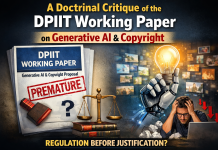Finally, it’s time when the court, as in the case of IPRS v. Eastern India Motion Pictures (1977 AIR 1443), will have to revisit the concept of copyright infringement in underlying musical works incorporated in a cinematographic film. The status quo however varies from the position back in 1977 due to the enactment of the 2012 Amendment to the Copyright Act. This amendment has specifically added a clause in section 18 of the act, which discusses the issue at hand vaguely but satisfactorily to draw a workable interpretation. This is in light of a case has been filed in the Madras HC by 6 movie producers of the Tamil film industry, seeking sole ownership in the songs composed by Ilayaraja for their films.
BACKGROUND OF THE DISPUTE
Recently, as reported, music composer Ilayaraja had freshly announced that on occasion of him parting ways with IPRS, he is the sole person supposed to receive royalties on unauthorized communication of his songs to the public, either by singers, instrumentalists or anyone. He stated:
“If you wish to sing and perform my songs on stage without prior intimation, you are liable for legal action. This also includes people who play my music in instruments. And you all have to realise this is wrong. The royalty fee would go to Cine Musicians Union. Please understand that I’m not stopping you from singing. You are paying royalty for the money you earn and not for my song. If you’re singing my songs for free, then you won’t have to pay me. But, if you are earning money by singing my songs, what is wrong in me asking a share of it? When the song itself is mine, how can you deny my share? After all, it is a small amount and I do all these to legalise things.”
This position was criticized and has been disputed by various film producers who have claimed that once the song is incorporated in a film, all ownership is transferred to the producers and the composer cannot claim royalty on its commercial exploitation or performance. The reasoning which was forwarded in lieu of the same was that, on event of commissioning of work, the music composer is paid a compensation on the part of the film producer. This automatically extinguishes his ownership rights in the work. The same rationale has been taken up in the recently filed plea in the Madras High Court, as reported here.
LEGAL POSITION AND ANALYSIS
The Copyright Amendment Act, 2012, added certain provisions to section 18 of the Copyright Act, 1957. The relevant amended section reads as follows:
18.Assignment of copyright.— (1) The owner of the copyright in an existing work or the prospective owner of the copyright in a future work may assign to any person the copyright either wholly or partially and either generally or subject to limitations and either for the whole term of the copyright or any part thereof:
……………………………………….
Provided also that the author of the literary or musical work included in a cinematograph film shall not assign or waive the right to receive royalties to be shared on an equal basis with the assignee of copyright for the utilization of such work in any form other than for the communication to the public of the work along with the cinematograph film in a cinema hall, except to the legal heirs of the authors or to a copyright society for collection and distribution and any agreement to contrary shall be void………………………………………………
The Statement of objects and reasons of the Copyright Amending Act 2012 is an effective tool to decipher the intent behind this particular amendment. It states in clause 3 (x) that the Act has been brought in to ensure that authors of musical works, specifically ones included in cinematographic films, receive due royalties on commercial exploitation of these works. The independence of rights in underlying musical works with respect to cinematographic films (where these songs are incorporated) has also been clarified via an amendment to Section 17, bringing in the proviso which states:
“Provided that in case of any work incorporated in a cinematograph work, nothing contained in clauses (b) and (c) shall affect the right of the author in the work referred to in clause (a) of sub-section (1) of section 13.”
The intent of the same can be ascertained from clause 3(viii) of the Statement of object and reasons.
THE QUESTION OF OWNERSHIP
It is important for us here, to delve into a few concepts of copyright ownership. There is a vital difference between the concepts of works for hire, or works made in the course of employment and the works made by an independent commissioner. The film producers will have to recognise an important difference. To be treated as an employee, by virtue of which whole ownership in the work automatically goes to the employer, there are certain conditions which need to be met. Courts look at the nature of relationship and what a person does in his day-to-day activities. Further, there is a control test, which defines the amount of control and the direction of the employer in the work, which is determinative of the existence of an employment or a work-for-hire arrangement.
On the contrary, if such control does not exist, and there is an independent compensation based agreement where the author substantially controls the expression provided, then the copyright generally rests with the person commissioned to do the work. However, it is an acknowledged concept that an implied obligation to assign the ownership to the person who commissions the work exists in certain cases.(Bently and Sherman, Intellectual Property Law (OUP 2015) 123).
These arrangements exist unless there is a specific contract explicitly providing for something else. For example, even if the control test is not fulfilled but there exists a contract, establishing a work for hire agreement, then of course the relationship will be treated as one of an employer-employee.
It is an accepted principle that music composers independently create the songs which are incorporated in the film, on the basis of general directions provided by the owners of the cinematographic work. There is no substantial control exercised over the expression which comes out of the musical workThis arrangement rather fits in the independently commissioned work category along with the implied obligation to assign, as discussed above.
Another interpretation of this arrangement has been argued elsewhere by certain scholars and practitioners, stating that- the right of the author referred in Section 17 refers only to royalty rights and moral rights of the author and does not take away the producer’s ability to claim first ownership under Section 17(b) or (c) of the Act. Had the intent been to do away with first ownership of a producer, the amendment should have reflected changes in Section 17 (b) and (c) as well. This argument, basically establishes first ownership by compulsorily implying a work-for-hire agreement in musical works which are made to be incorporated to a film.
I take this opportunity to disagree with this argument on the following grounds:
- Section 17(a) and (b) specifically omits musical works. This shows the intention of the legislature to establish that a musical work incorporated in a film cannot automatically be considered as one made under a contract of service. Consequently it cannot be claimed to be firstly owned by the film producer, unless there is an explicit contract to the contrary.
- The control test is never fulfilled in these cases. Practically, a producer merely provides the context of the song, and the musical work is an independent creation of the composer. Merely a compensation paid for the same, does not automatically render the relationship as a work for hire one, insofar as there is no contract to the contrary.
- Further, for songs composed before the 2012 amendment, the opinion of Justice Krishna Iyer in the v. EIMPAA case clearly establishes the distinct nature of the rights in the underlying musical work, when used independent of the cinematographic work. This is due to the explicit exclusion of musical works from 17 (a) and (b). Hence the first ownership of these musical works always rests with the music composer, unless there is a contract to the contrary. A written agreement assigning the copyright is imperative for any rights to be claimed in the said musical work by the film/cinematographic work’s producer.
- To build upon this, it is relevant to look into the case of Gee Pee Films Pvt.Ltd. v. Pratik Chowdhury [(2002) 1 CTMR 40, (para.16)], where the learned judge has held that such an arrangement for writing, composing and singing songs to be incorporated in the film on a remuneration basis, is an instance of a “contract for service” and not a “contract of service”. Further the judge has clarified that the works omitted in section 17(b) cannot be blindly held to be included within its ambit and termed as a definite employer-employee relationship.
Hence the composer is typically the first owner of the musical work and does not indulge on a work for hire basis with the film/cinematographic work’s producer, unless there is a contract specifically providing for the same.
THE QUESTION OF ROYALTY DISTRIBUTION
The Copyright Amendment Act in its newly inserted proviso under section 18 has, with respect to this assignment, imperatively provided for the compulsive equitable royalties to both the composer as well as film producer, when the song is played in any other form apart from the film. Due to assignment, the ownership might have been shifted completely to the producer of the film, however this is applicable only to the extent of it being used in the film and not otherwise. If the song is played or performed independent of the film, an equitable share of royalties has to be provided to the composer as well. Equitable ownership is a well-established principle in the case of independently commissioned works, across jurisdictions, and it needs to be adhered to specifically when the mode of exploitation is not one as to be covered in the assignment.
This interpretation flows from the principle established by Justice V.R.Krishna Iyer in his opinion in the IPRS v. Eastern India Motion Pictures case. He stated:
“ A harmonious construction of S. 14, which is the integral yoga of copyrights in creative works, takes us to the soul of the subject. The artist enjoys his copyright in the musical work, the film producer is the master of his combination of artistic pieces and the two can happily co- exist and need not conflict. What is the modus vivendi ? The solution is simple. The film producer has the sole right to exercise what is his entitlement underS. 14(1)(c) qua film, but he cannot trench on I the composer’s copyright which he does only if the ‘music’ is performed or produced or reproduced separately, in violation ofS. 14(1)(a). For instance, a film may be caused to be exhibited as a film but the pieces of music cannot be picked out of the sound track and played in the cinema or other theatre. To do that is the privilege of the composer and that right of his is not crowned in the film copyright except where there is special provision such as in S. 17, proviso (c). So, beyond exhibiting the film as a cinema show, if the producer plays the songs separately to attract an audience or for other reason, he infringes the composer’s copyright. Anywhere, in a restaurant or aeroplane or radio station or cinema theatre, if a music is played, there comes into play the copyright of the composer or the Performing Arts Society. These are the boundaries of composite creations of art which are at once individual and collective, viewed from different angles.”
Even though, this is an extreme construction, which totally denies any ownership to producers in the use of the musical work apart from the film, it is unwarranted to the extent to ignores the principle of equitable ownership. However, the essence of this paragraph clearly establishes the intent of the amendment to the extent of its language, i.e. equitable ownership and royalties. Hence, this interpretation is an important one in the case at hand.
Both Ilayaraja and film producers cannot claim complete ownership in the musical works incorporated in the films, and the law needs to be interpreted keeping in mind the principles stated above, unless there is a contract to the contrary.
It is a settled position that equitable royalties are to be paid to both the composer (collecting society/ legal heir) as well as the film producer when the musical work is independently used i.e. without the film (as established above). However, royalties to the music composer when the song is played or performed with the cinematographic work, is a technical grey area and it will be interesting to see the interpretation of the Court on the same. In my view, royalties should be payable to the composers only when the song is played or performed independent of the film and not as a part of it, irrespective of the forum of display. The reason for the same is that, once assignment of the musical work with respect to incorporation in the film takes place, the author extinguishes all ownership rights in the work to the film producer, to the extent of use with the film. The distinction between ownership and authorship herein exist only with respect to paternity and morality rights, and the author can only claim that. Hence no claim for royalties on such broadcast can be argued to subsist ideally, unless there is an agreement to the contrary.
Nevertheless, some have argued that the third proviso to section 18 includes royalties to the composer even when the song is shown with the film, insofar as it is not in the cinema hall.
The industry practice has also been to seek royalties, as the Copyright Act merely provides for “no royalty to the author when the film is shown in the cinema hall” (section 18 proviso). I, personally do not agree with this argument due to the reason mentioned above as well as the basic logic which goes into this is the existence of the remuneration. As the composer is anyway paid a lumpsum for incorporation of the song in the film, subsequent royalties on broadcast of the same with the film will overly compensate the composer. Further, I cannot think of an intelligible differentia to treat the display in a cinema hall any differently from any other forum. This however is mainly a prima-facie claim and the court is yet to look into this question of existence of an intelligible differentia in an upcoming case.
Anyway, it will be interesting to see the stand which the court takes upon this.
REGISTERED SOCIETY COMPUSLORY?
In the case at hand, Ilayaraja has referred to the royalty going to the Cine Musician Union. This is in violation of section 33 of the Copyright Act, 1957, which provides that only registered copyright society can be licenced to collect royalties on behalf of the original author or owner (as per the case). This is not the case here as the Cine Musician Union is not a registered copyright society under this section. Hence such royalties cannot be said to be accruing in favour of the afore-mentioned union. As far as the question of the author directly collecting his royalty is concerned, there is no restriction on the same in the Copyright Act, however there may be practical difficulties for the author to monitor the disbursement of such royalties on every occasion of exploitation and use. It has although been held by the Bombay HC that section 33 of the Copyright Act cannot be interpreted to compulsorily compel every copyright owner to resort to a separate body in order to enforce their rights. (Leopold café v. Novex Communications). This case further ruled that due to application of section 30, if a contract of agency is proved, then certain rights can be enforced upon by the agent. Hence, Ilayaraja can resort to explicitly establishing an agency contract with Cine Musician Union, to enforce this arrangement in law. The requirement though is – necessary and specific indication of such an agency relationship on the licences issued by the agent on behalf of the principal.
Overall it will be interesting to see how the court proceeds on all these questions!
Image source: here












